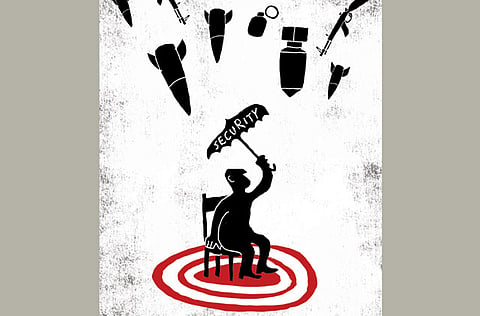Libya has an uphill task
The task for Libya’s new interim leadership is daunting, but not insurmountable

The September 11, 2012, attack on the US Consulate in Benghazi and the ensuing death of four American diplomats, including the US Ambassador, Christopher Stevens, highlights the formidable security challenge facing Libyan authorities as they embark upon a new phase in their democratic transition. Security problems had been already high on the agenda of the new-elected General National Congress (GNC). But the murder of Stevens heightened awareness of Libya’s security woes and the reassuring signals sent by the relative calm which marked the July 7 elections have all but dissipated.
The Benghazi attack perpetrators used rocket-propelled grenades and automatic rifles. That disturbingly showed how readily-available are all weapons in today’s Libya. After months of an all-out war between loyalist troops and revolutionaries supported by Nato and Gulf countries, Libya has become a huge open-air arms depot. Recently-published report by the Harvard Law School’s International Human Rights Clinic (IHRC) pointed out that “Gaddafi left an arsenal of tens of thousands of tonnes of weapons, ranging from bullets and mortars to torpedoes and surface-to-air missiles”. The proliferation of weapons and unexploded ordnance constitute a risk not only to Libyans, but also to foreign businesses and ridding the country of them is onerous and time-consuming. Moreover, Libyan weapons are reportedly flowing into neighbouring countries, especially south of the Sahara.
It is not surprising that violent incidents continue unabated. In a recent report, UK-based risk analyst “Maplecroft” noted that “conservative estimates place the number of people killed as a result of clashes and ethnic tensions since the overthrow of the regime at between 300 and 400.” The report voiced concern about a “recent string of kidnappings, small bomb explosions, grenade attacks and discovery of explosive devices in Benghazi”, including incidents aimed at “western targets”. It noted also that “high-profile assassinations remain a key source of instability and exacerbate security concerns”. Since the beginning of the year, 15 current and former army officers have been killed.
Months of violent strife led to the fall of the Muammar Gaddafi regime, but also to exacerbated divisions. Arbitration of disputes has been very tricky, especially since more than four decades of authoritarian rule have prevented the emergence of credible state institutions. Karim Mezran of the US Atlantic Council talks about various “fault lines” in today’s Libya: “Not only pro and anti-Gaddafi, but also tribe versus tribe, city versus city, young versus old, Islamist versus secularist, poor versus rich and so on”.
War has left Libyan society with lots of old (and new) scores to settle. On top of the old grudges, there are violent acts by Salafists against Sufi traditionalists, attacks by old Gaddafi foes against former Gaddafi officers, and revenge by Gaddafi loyalists against army and intelligence who have joined the new regime. According to Mezran, senior political and security officials believe that “old regime followers are to blame for a great part of the violence. According to them, there are more than 500,000 and perhaps as many as one million supporters of former Libyan leader Gaddafi living in exile.
It is interesting to note that domestic public opinion seems to fear “Al Qaida or other Islamic militant groups” as much as “members of the former regime”. A recent Gallup poll shows that 80 per cent of public opinion sees pro-Gaddafi loyalists as a “threat” while 76 per cent perceive Islamic radicals as a peril to the country’s security. No less than 60 per cent of Libyans, however, fear “militia or rebel fighters”. Many, in fact, believe that the tens of thousands of rebel militias who are supposed to be helping the army and the police stabilise the country have their own agenda and are not always on the side of neutral law enforcement. Frederic Wehrey, senior associate at the Carnegie Endowment for International Peace, believes: “The strategy of trying to dismantle the regional militias while simultaneously making use of them as hired guns might be sowing the seeds for the country’s descent into warlordism.”
But all is not bleak. Recently released figures show that hydrocarbon production figures so far have exceeded expectations. This tends to prove the view that oil installations have been essentially secured by the state. “With the help of Benghazi, the central government controls more or less the oil sector in the country,” says French strategic expert Antoine Sfeir. Libya remains endowed with natural resources that could allow the country’s economy to bounce back fairly quickly. The most recent edition of the “African Economic Outlook” points out that “the economy contracted 41.8 per cent in 2011, but as oil production recovers, it should expand 20.1 per cent in 2012 as reconstruction takes holds, followed by a gain of 9.5 per cent in 2013”.
The tasks for Libya’s new interim leadership are certainly daunting, but not necessarily insurmountable. They can count not only on the country’s oil reserves, but also on the hopes pinned on them by the population and the strong commitment of Libyans to their unity despite all previous predictions of “balkanisation”.
But many experts feel that for Libya to hold together, there needs to be another process set in motion — that of national reconciliation. UN Secretary-General Ban Ki-moon calls this “the most important factor” to guarantee political stability in the country, while Libya-based analyst Umar Khan thinks: “It is the most important issue facing the new Libya. If not solved, it will not only stop Libya from making any further progress, but it could also destabilise the region”.
Interim leaders will have to work hard to restore good relations with their American ally and to disarm the security booby-trap, which could seriously discourage foreign business operators. Newly-elected Prime Minister Mustafa Abu Shagour has already pledged to make security his top priority. Closer cooperation with post-revolutionary Tunisia and Egypt on all issues, including those pertaining to regional security, might also prove to be strategically necessary.
Oussama Romdhani is the former Tunisian communication minister.



